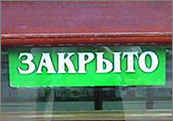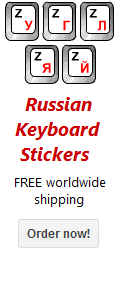| FR | About us | Home | User agreement | Link to us |
Suffixes of Russian Nouns
The essential parts of most Russian nouns are the root, the suffix, and the ending. A suffix is usually a group of letters which goes at the end of a word and carries a new meaning or grammatical properties. For example, the suffix -изм (-ism) added to the word капитал (capital) turns it into an abstract noun капитализм (capitalism) in both Russian and English. You can get a better understanding of nouns in the Russian language by paying close attention to their suffixes. The tables below sum up the most common suffixes and their roles in formation of Russian nouns.
Note that some masculine nouns may not have feminine forms. In such cases the masculine nouns are used for both males and females, for example Он – космонавт (He's a spaceman) and Она – космонавт (She's a spacewoman).
1. Russian suffixes that form nouns designating
occupations, trades and professions
|
SUFFIXES |
Examples of Russian nouns |
Translation |
|
| masculine | feminine | ||
|
-тель (m) -тельница (f) |
учитель, писатель ---------- строитель |
учительница, писательница ---------- no feminine form |
a teacher, a writer ---------- a constructor |
| -ник (m) -ница (f) |
ученик, художник ---------- дворник |
ученица, художница ---------- no feminine form |
a student a artist ---------- a wiper |
|
-чик (m) -чица (f) |
лётчик, переводчик |
лётчица, переводчица |
a pilot, a translator |
| -ик (m) | математик, историк |
feminine forms not used |
a mathematician, a historian |
2. Russian suffixes that form nouns designating people of various
societies, nationalities, residencies and occupations
|
SUFFIXES |
Examples of Russian nouns |
Translation |
|
| masculine | feminine | ||
|
-ец (m) -ка (f) |
австриец американец |
австрийка американка |
an Austrian an American |
| -ин (m) -ка (f) |
болгарин | болгарка | a Bulgarian |
|
-анин (m) -янин (m) -анка (f) -янка (f) |
гражданин египтянин |
гражданка египтянка |
a citizen an Egyptian |
| -ист (m) -истка (f) |
гитарист | гитаристка | a guitarist |
|
-тор (m) -атор (m) |
автор оратор |
- |
an author an orator |
| -ка (f) |
- |
студентка | a student |
3. Russian suffixes that form nouns designating
ideas and concepts
|
SUFFIXES |
Examples of Russian nouns |
Translation | ||
| masculine | feminine | neuter | ||
|
-изм (m) |
героизм капитализм |
- | - |
heroism capitalism |
| -ость
(f) |
- |
гордость честность |
- |
pride honesty |
|
-ция
(f) |
- |
лекция акция |
- |
lecture action |
| -ство (n) | - | - | общество чувство |
society feeling |
|
-ани, -ание (n) -ни, -ние (n) -ени, -ение (n) |
- | - |
понимание движение сочинение |
understanding movement composition |
4. Russian suffixes that form
diminutive nouns and pet names
|
SUFFIXES |
Examples of Russian nouns |
Translation | |
| masculine | feminine | ||
|
-ик -чик -ок -ек |
братик диванчик листок сыночек |
- |
a little brother a small sofa a small leaf a son |
| -ка -ичка -ечка |
- | мышка водичка Танечка |
a little mouse water pet name for Tatyana |
Got questions?
Ask them in the Russian Questions and Answers — a place for students, teachers and native Russian speakers to discuss Russian grammar, vocabulary, pronunciation, and other aspects of the Russian language.
Copyright 2001-2026 MasterRussian.com | Privacy Policy | Contact Us
 Russian Lessons
Russian Lessons
- Russian alphabet
- Names of letters
- Russian Q&A new
- Pronunciation: Cons.
- Pronunciation: Vowels
- Noun Gender/Number
- Cases of Nouns
- Russian Greetings
- Personal Pronouns
- Learning Russian
- 1000 Common Words
- 500 Russian Verbs
- Top Russian Nouns
- » All lessons
- » Guest lessons
 Browse Topics
Browse Topics
- Start learning Russian
- Forum
- Bookstore
- Dictionaries
- Russian - basic
- Russian - adv
- Pronunciation
- Russian Blog new
- Reading
- Test & quizzes
- Translation
- Verbs
- Verb Conjugations
- Russian numbers
- Russian Tests new
- Vocabulary
- Writing
- Folk music
- Fun stuff
- Leo Tolstoy
- Learner's lore
- Literature
- Personal blogs
- Picture Dictionary new
- Proverbs
- Publications
- Radio & TV
- Russian culture
- Schools in Russia
- Russian Words
- Russian names
- Software
- Russian Words iPhone

Search MasterRussian

English » Russian dictionary

WORD OF THE DAY
![]() RSS
|
iGoogle
|
My Yahoo!
RSS
|
iGoogle
|
My Yahoo!
Meaning: to be able to, can, may
Pronunciation: [mohch']
Learn Russian words more... »
TODAY'S STREET SIGN

Russian: Закрыто
English: Closed
FOLLOW US ON TWITTER

MasterRussian on Twitter


